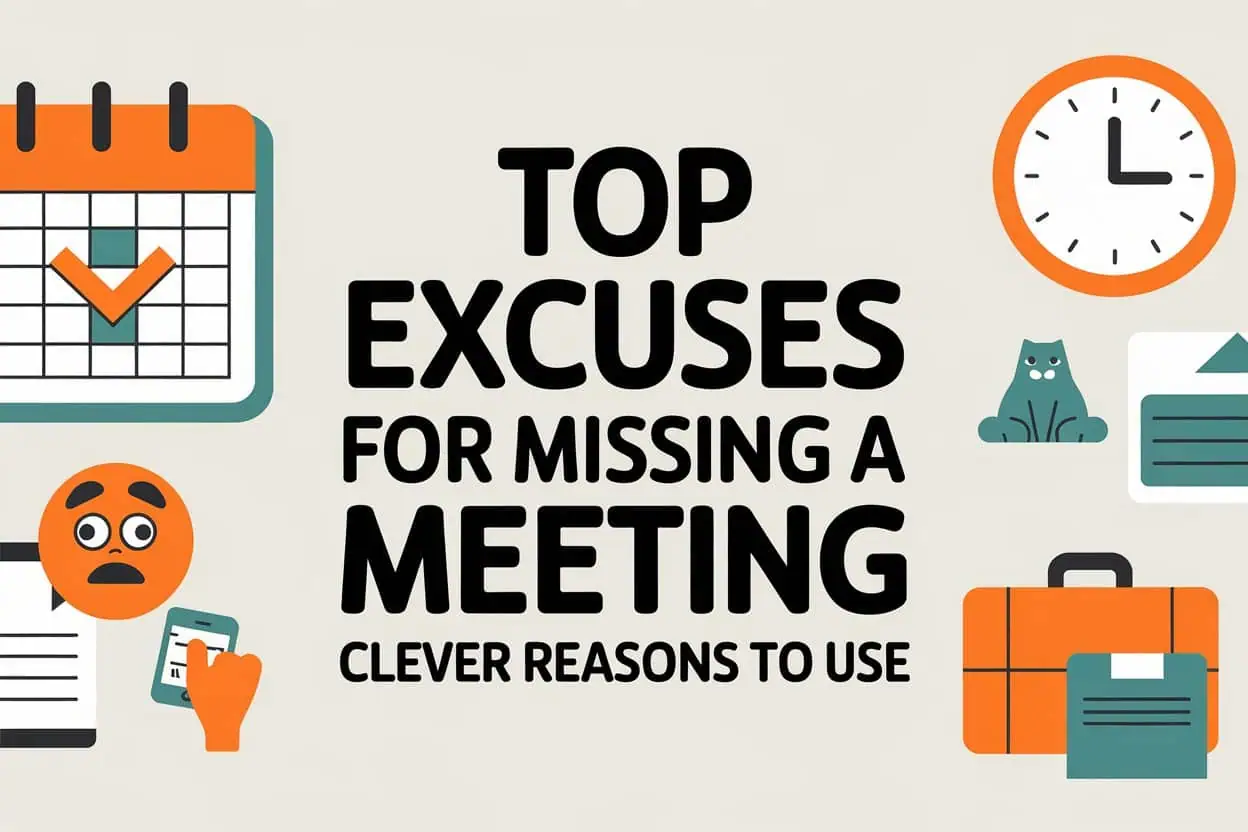Top Excuses for Missing a Meeting: Clever Reasons to Use
When you need excuses for missing a meeting, honesty is often the best policy. Common reasons include traffic delays due to accidents or construction, sudden family emergencies, or urgent pet health issues.
Weather can also provide a legitimate excuse if conditions are unsafe. It’s essential to communicate your reason promptly and professionally. A simple acknowledgment of your absence, followed by a brief explanation and a suggestion to catch up later, shows respect for your colleagues’ time.
If you want to know more about crafting the perfect apology and effective communication strategies, keep exploring.
Top 10 Most Believable Excuses for Traffic Delays
We’ve all been there—stuck in traffic and running late for a meeting. Traffic congestion can turn a straightforward commute into a frustrating ordeal, leaving you scrambling for an excuse.
Here are the top 10 most believable excuses for those dreaded delays.
- Accident Ahead: A common sight on the road, accidents can cause significant backups. You can easily cite this when you’re late.
- Road Construction: Unexpected detours due to construction can impact your route dramatically.
- Weather Conditions: Heavy rain or snow can slow traffic to a crawl, making this an understandable reason for being late.
- Public Transport Delays: If you rely on public transit, a delay is often beyond your control.
- Emergency Vehicle: When an ambulance or fire truck passes, traffic tends to halt, offering a valid excuse.
- Flat Tire: Car troubles happen, and a flat tire can derail your schedule.
- GPS Malfunction: Technology isn’t infallible; a GPS error can lead you astray.
- School Zone Delays: During drop-off times, school zones can create unexpected holdups.
- Animal Crossing: Wildlife on the road can cause unplanned pauses.
- Unexpected Detour: Sometimes, a route change is necessary, leading to delays.
Keep these in mind for your next meeting!
Common Excuses for Family Emergencies
Family emergencies can pop up unexpectedly, often leaving you scrambling for an explanation when you need to miss a meeting or event. These situations can arise without warning, making it vital to have a few common excuses ready that resonate with your colleagues.
Here are some you might consider:
- Medical Emergency: A sudden health issue with a family member can necessitate immediate attention.
- Childcare Issues: If your usual childcare arrangements fall through, it’s a valid reason to miss your obligations.
- Family Crisis: Any urgent obligation related to a family crisis, like a legal matter or financial issue, can warrant your absence.
- Death in the Family: This unfortunate event is universally understood and respected as a reason for missing commitments.
Using these excuses can help you navigate the tricky waters of missed meetings.
Just remember to communicate promptly and respectfully. Most people will understand that family comes first, especially during a time of distress. Being honest and direct about your situation also fosters trust and respect among your colleagues.
Unexpected Pet Emergency
Dealing with an unexpected pet emergency can be just as urgent as a family crisis, often leaving you with no choice but to miss a meeting. When your furry friend suddenly shows signs of distress, your priority shifts immediately to their health.
Whether it’s a sudden illness, injury, or even a poisoning scare, you can’t ignore the need for swift action. Rushing to the emergency vet can feel like a whirlwind. You may have to leave a meeting abruptly or inform your colleagues that you can’t attend.
It’s essential to communicate that your pet’s well-being demands your attention and that you’re addressing a serious situation. Most people understand that pets are family members, and their health issues can be vital.
Before heading to the vet, gather any necessary information about your pet’s condition. This guarantees you can provide the vet with the details they need for a quick diagnosis.
Dishonest Excuses for Absence
Crafting an excuse for missing a meeting can be tempting, especially when the truth feels less than compelling. You might be inclined to whip up some creative fabrications that, while humorous justifications, can ultimately damage your credibility.
Here are some common dishonest excuses to avoid:
- “My car broke down on the way to the meeting.”
- “I had a last-minute family emergency.”
- “I completely lost track of time.”
- “I thought the meeting was scheduled for tomorrow.”
While these may seem harmless, relying on such fabrications can backfire. Your colleagues might start questioning your reliability if they catch wind of your untruths. Instead of risking your reputation, consider the consequences.
Missing a meeting occasionally is understandable, and honesty can go a long way. If you find yourself in a tight spot, it’s better to be upfront about your situation rather than concocting elaborate tales.
Not only does honesty maintain your integrity, but it also fosters trust with your team. So, next time you’re tempted to stretch the truth, think twice about how a little honesty could benefit you in the long run.
Best Excuses for Weather Issues
Weather can sometimes throw a wrench in your plans, making it difficult to attend meetings. When faced with weather-related challenges, it’s essential to communicate effectively and honestly.
If severe storms are forecasted, you might say, “The impending storm has made travel unsafe, and I can’t risk being on the road.” This shows you’re prioritizing safety.
For those areas experiencing natural disaster impacts, be straightforward about the situation. You could explain, “Due to the recent flooding in my area, I’m unable to leave my home.” This emphasizes the urgency and seriousness of your circumstances.
If it’s just a heavy snowfall, you might say, “The snow accumulation has blocked my driveway, and I can’t get out.” This is relatable and shows you’re making an effort to attend but simply can’t due to the conditions.
Using these excuses demonstrates a genuine approach while ensuring your colleagues understand the situation.
Timing Your Message Perfectly
When you need to miss a meeting, timing your message can make a significant difference in how it’s received.
Effective message delivery is essential, as it sets the tone for your absence and affects the perception of your professionalism.
Here are some timing strategies to take into account:
- Notify early: Inform your colleagues as soon as you know you can’t attend. This shows respect for their time.
- Choose the right moment: If possible, send your message during regular working hours. It increases the chances of a prompt response.
- Avoid last-minute notifications: Giving late notice can come off as careless. Aim for at least a few hours of advance notice, if not more.
- Follow up: After your message, check in later to address any concerns or questions that may arise.
Template for Apology Texts
While it’s essential to communicate your absence clearly, having a template for apology texts can streamline the process. An effective apology message not only conveys your regret but also shows respect for the recipient’s time and effort.
Here’s a simple template you can adapt:
—
Hi [Name],
I hope you’re well. I’m really sorry I missed the meeting on [Date/Time]. Unfortunately, [brief reason, e.g., a scheduling conflict or unforeseen circumstance] prevented me from attending.
I value our discussions and regret not being part of that conversation.
Please let me know if there’s a way I can catch up on what I missed or if we can reschedule. I appreciate your understanding and look forward to reconnecting soon.
Thanks again!
Best,
[Your Name]
—
Using this template guarantees you follow proper text etiquette and maintain professionalism.
Customize the details to fit your situation, but keep the tone sincere and straightforward.
Apology Note for Missed Meeting
Missing a meeting can feel like dropping a ball in a game you care about.
It’s essential to acknowledge your absence and maintain professional accountability. A well-crafted apology note can demonstrate your commitment to effective communication and help mend any potential rifts.
Here’s what to include in your apology note:
- Acknowledge the missed meeting: Start by admitting you weren’t there.
- Express genuine regret: Share your feelings about the impact of your absence.
- Provide a brief explanation: Without making excuses, briefly mention why you missed it.
- Suggest a follow-up: Propose a time to catch up on what you missed.
Your note could look something like this: “I’m sorry for missing our meeting on [date]. I regret not being there and understand it may have disrupted our plans.
Due to [brief reason], I couldn’t attend. I’d love to catch up on what I missed—are you available [suggest a time]?”







